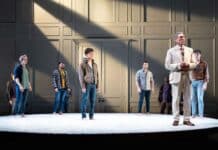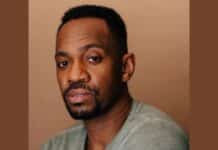When it was founded in 1998 in Herndon, Virginia, Elden Street Players, a community theater run by volunteers, was a small theater with big ambitions. With funding from the town and a dedicated board and community, it grew into a 114-seat black box theater alongside warehouses in the Northern Virginia suburbs. The suburban community theater became known for producing edgier, newer works more in line with downtown Washington, DC, venues like Studio, the now-defunct Source, and Woolly Mammoth.
By 2013, Elden Street Players was ready for its next step. The board appointed one-time child actor and theater creative Evan Hoffmann as its first full-time producing artistic director, and under his direction, the volunteer troupe became the fully professional NextStop Theatre Company. After a dozen years at the helm of the growing regional theater, Hoffmann stepped away, making room for New York City–based director, producer, and arts educator Heather Lanza to lead NextStop to its next level.

DCTA: You have some family in the Virginia area, so had you seen or heard about NextStop’s work?
Heather Lanza: I do have family in the area, so I grew up coming down to Northern Virginia and spending a lot of holidays in the area, but I had never actually seen anything at NextStop. I was really excited to learn about its history, which is so rich, especially the transformation from being this really amazing community theater into this as amazing professional space.
With your extensive experience in New York and regional theaters, including both as a freelance director and a co-leader of Waterwell theater company in NYC, what excited you about making the move to Northern Virginia?
I just spent a decade working at Waterwell, a company that’s really focused on civic-minded art and theater that [asks] different community and civically engaged questions. One thing that’s really important to me is that I am always thinking about what it means to tell stories in, with, and for a community. What role do the arts play in a community setting? And how do we as artists think about what those needs are and how that changes over time? What was really exciting to me about NextStop was the really, really deep community roots that have been there since the beginning … seeing how the community love is really reciprocal. The amount of love the [Herndon] community has for the space — they really view it as an arts hub for them with really amazing high-quality professional work in their backyards — that was a huge draw for me.
Coming in mid-season as a newcomer, what are the first steps you want to take in your producing artistic director position?
At first, I thought I wanted to start with my season. But what’s been cool about starting now is that I’m really getting to learn the space and learn what producing at NextStop is like. Who are the artists? What are audience expectations of the season? What works well in the space, and what are some growth areas in the space? That has actually been really helpful.
And with that, I’m focusing on season planning. We’re gearing up to announce that in the spring.
I’m also really thinking about audience development and community development. The community around and within NextStop is like a warm hug. They love the space. A big question that I’m thinking about is how we can make sure NextStop stays a hub and a space for our existing audiences and community members, but how can we make sure we’re expanding that community to be really inclusive of everyone in the Herndon/Reston area in the DC Metro area, and that we are expanding our audiences to be even more diverse, even more inclusive, to be expanding on the really awesome dialogue that’s happening with our existing community members.
What do you hope to bring from your background and experience to NextStop and the greater Herndon community?
My passion and what I love doing artistically is new play development and producing new works. I’m looking to bring that to the Herndon/Reston community. I’m looking at the needs of writers and generative artists in the DC Metro area. What could we offer for artists that would be an additive step in their process to help make and develop their work in the way that’s going to help it grow and really shine? So I’m really excited about that.
How else are you acclimating to this big move to Herndon?
My partner and I signed a lease in Herndon, so we’ll be very close to the theater, which will be really nice. A big focus of mine right now is listening and learning. Every community is unique, every community is different. My job, especially in this first amount of time here, is to get to know the other theater companies in the area, get to know the community, get to know what people are making and seeing both in and outside of theater. There’s a robust visual art community and music community in Northern Virginia. Museums aplenty. I could go see something new every single day. So, I’m trying to just absorb all that to understand experientially what it means to live as an artist and as a culture maker within this community.
Finally, with “next” in the theater’s name, how are you thinking about your role, the company’s role, and the community’s role for the next generation?
I am really into exploring how we can be pipelining local artists better. What do the local writers and artists here want and need from a company that could potentially produce their work down the line? What could we offer that would be most helpful in their process as generative artists? Then, thinking about other companies in the community who have that same want in terms of pipelining new works: Where can we be collaborating on some of those new plays? Commissions would be amazing. I would love to get to a point where NextStop could commission new work. There are a lot of financial implications, so that’s probably a couple years down the line. But that is definitely a bigger-picture goal and dream because [by commissioning] you really get to craft something [more] from the ground up, thinking about your audiences and your communities in a very different way, than even bringing in a play that’s been workshopped.
Final thoughts?
I’ve been inspired because I feel that the DMV theater community is so warm and welcoming and really super supportive of each other. There is a lot of potential … we’re all experiencing the same thing. We’re all asking the same questions about what it means to be making theater in this post-pandemic moment. I say, “Game on.” I’m a firm believer that the more minds you have on a question, the better ideas you get. It’s why I love making theater and why I love collaboration. We all know how to collaborate well in our playmaking. The question becomes: How can we take that same approach to re-envision what it means to be a nonprofit art space and to be theater makers grappling with this really hard moment.
To keep up with NextStop Theatre Company, visit nextstoptheatre.org.
SEE ALSO:
NextStop Theatre welcomes Heather Lanza as new artistic director (news story, December 12, 2024)
First stop for a show in Herndon? NextStop Theatre Company (feature by Lisa Traiger, October 23, 2024)
Evan Hoffmann to step down as artistic director of NextStop Theatre (news story, June 20, 2024)

About the Wendi Winters Memorial Series: DC Theater Arts has partnered with the Wendi Winters Memorial Foundation to honor the life and work of Wendi Winters, the DC Theater Arts writer who died in the Capital Gazette shooting in Annapolis, Maryland, on June 28, 2018. To honor Wendi’s legacy, the Wendi Winters Memorial Foundation has funded the Wendi Winters Memorial Series, monthly articles to be produced by DC Theater Arts to bring attention to theater companies and theater practitioners in our region who engage in exemplary work that makes our community a better place. The centerpiece of these articles is a series we are calling “The Companies We Keep,” articles offering an in-depth look at one local theater company each month. In these times of division and conflict, DC Theater Arts chooses to celebrate those who do good.
For more information on DC Theater Arts’ Wendi Winters Memorial Series, check out this article graciously published by our friends at District Fray Magazine.



